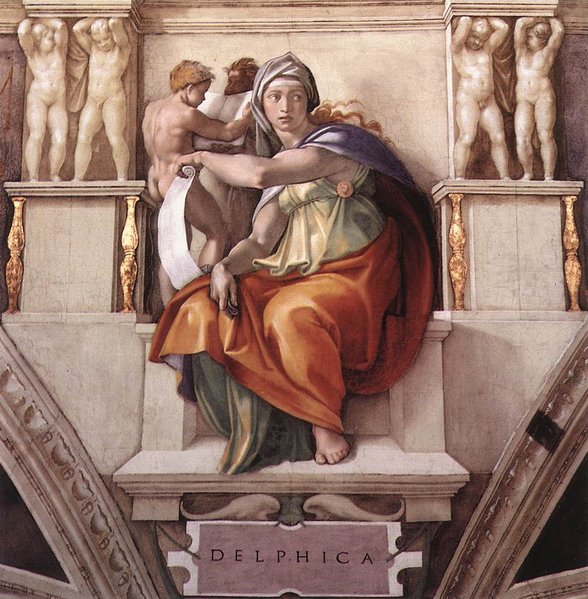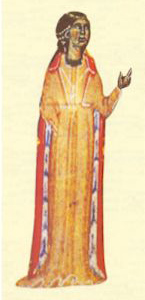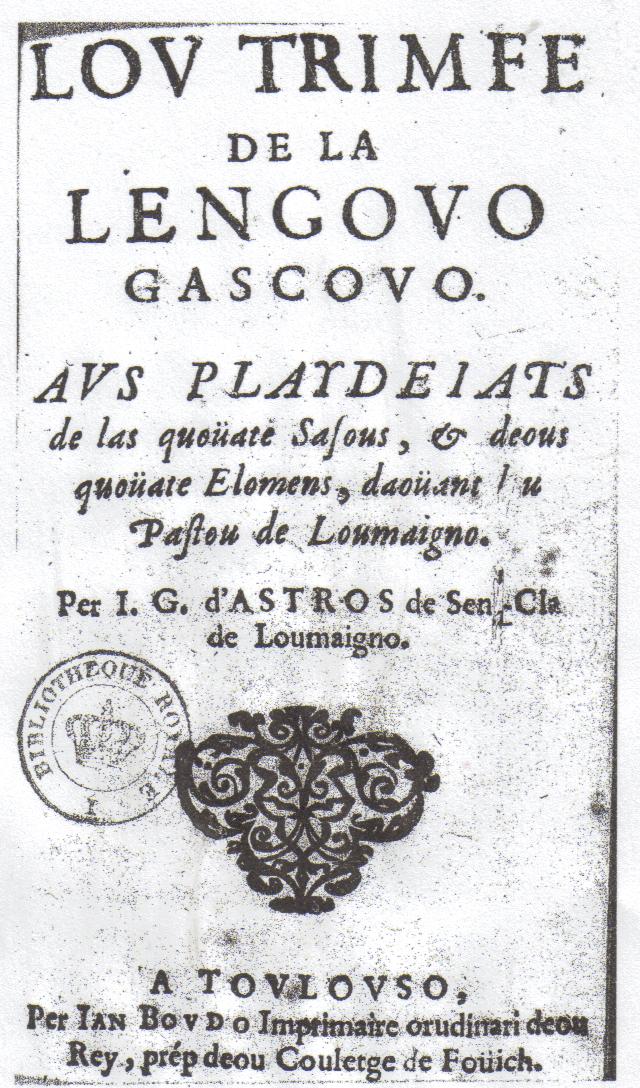|
Compiuta Donzella
(La) Compiuta Donzella, called either di Firenze or Fiorentina, was the earliest woman poet of the Italian language, active in the second half of the 13th century.This discounts the probably legendary Nina Siciliana and Gaia da Camino, of whom no works survive. Three of her sonnets survive in a single manuscript, and one is half of a '' tenzone''. ''Compiuta'' may be her given name, but more probably a ''senhal'' (code name). Her full name translates "the accomplished young lady from Florence". Her existence was once in doubt and she was considered a construct of the poets, but this view has been discarded. In ''A la stagion che 'l mondo foglia e fiora'' ("In the season when the world sends forth leaves and flowers"), Compiuta complains of her father's choice of a husband for her. She is miserable at springtime, when other lovers are rejoicing. In ''Lasciar voria lo mondo e Dio servire'' ("I would like to leave the world to serve God"), she bemoans the state of the world: lack of ... [...More Info...] [...Related Items...] OR: [Wikipedia] [Google] [Baidu] |
Poet
A poet is a person who studies and creates poetry. Poets may describe themselves as such or be described as such by others. A poet may simply be the creator ( thinker, songwriter, writer, or author) who creates (composes) poems (oral or written), or they may also perform their art to an audience. The work of a poet is essentially one of communication, expressing ideas either in a literal sense (such as communicating about a specific event or place) or metaphorically. Poets have existed since prehistory, in nearly all languages, and have produced works that vary greatly in different cultures and periods. Throughout each civilization and language, poets have used various styles that have changed over time, resulting in countless poets as diverse as the literature that (since the advent of writing systems) they have produced. History In Ancient Rome, professional poets were generally sponsored by patrons, wealthy supporters including nobility and military officials. For inst ... [...More Info...] [...Related Items...] OR: [Wikipedia] [Google] [Baidu] |
Courtly Love
Courtly love ( oc, fin'amor ; french: amour courtois ) was a medieval European literary conception of love that emphasized nobility and chivalry. Medieval literature is filled with examples of knights setting out on adventures and performing various deeds or services for ladies because of their "courtly love". This kind of love is originally a literary fiction created for the entertainment of the nobility, but as time passed, these ideas about love changed and attracted a larger audience. In the high Middle Ages, a "game of love" developed around these ideas as a set of social practices. "Loving nobly" was considered to be an enriching and improving practice. Courtly love began in the ducal and princely courts of Aquitaine, Provence, Champagne, ducal Burgundy and the Norman Kingdom of Sicily at the end of the eleventh century. In essence, courtly love was an experience between erotic desire and spiritual attainment, "a love at once illicit and morally elevating, passionate and ... [...More Info...] [...Related Items...] OR: [Wikipedia] [Google] [Baidu] |
Year Of Death Unknown
A year or annus is the orbital period of a planetary body, for example, the Earth, moving in its orbit around the Sun. Due to the Earth's axial tilt, the course of a year sees the passing of the seasons, marked by change in weather, the hours of daylight, and, consequently, vegetation and soil fertility. In temperate and subpolar regions around the planet, four seasons are generally recognized: spring, summer, autumn and winter. In tropical and subtropical regions, several geographical sectors do not present defined seasons; but in the seasonal tropics, the annual wet and dry seasons are recognized and tracked. A calendar year is an approximation of the number of days of the Earth's orbital period, as counted in a given calendar. The Gregorian calendar, or modern calendar, presents its calendar year to be either a common year of 365 days or a leap year of 366 days, as do the Julian calendars. For the Gregorian calendar, the average length of the calendar year (the mea ... [...More Info...] [...Related Items...] OR: [Wikipedia] [Google] [Baidu] |
13th-century Italian Women
The 13th century was the century which lasted from January 1, 1201 ( MCCI) through December 31, 1300 ( MCCC) in accordance with the Julian calendar. The Mongol Empire was founded by Genghis Khan, which stretched from Eastern Asia to Eastern Europe. The conquests of Hulagu Khan and other Mongol invasions changed the course of the Muslim world, most notably the Siege of Baghdad (1258), the destruction of the House of Wisdom and the weakening of the Mamluks and Rums which, according to historians, caused the decline of the Islamic Golden Age. Other Muslim powers such as the Mali Empire and Delhi Sultanate conquered large parts of West Africa and the Indian subcontinent, while Buddhism witnessed a decline through the conquest led by Bakhtiyar Khilji. The Southern Song dynasty would begin the century as a prosperous kingdom but would eventually be invaded and annexed into the Yuan dynasty of the Mongols. The Kamakura Shogunate of Japan would be invaded by the Mongols. Goryeo resist ... [...More Info...] [...Related Items...] OR: [Wikipedia] [Google] [Baidu] |
Italian Women Poets
Italian(s) may refer to: * Anything of, from, or related to the people of Italy over the centuries ** Italians, an ethnic group or simply a citizen of the Italian Republic or Italian Kingdom ** Italian language, a Romance language *** Regional Italian, regional variants of the Italian language ** Languages of Italy, languages and dialects spoken in Italy ** Italian culture, cultural features of Italy ** Italian cuisine, traditional foods ** Folklore of Italy, the folklore and urban legends of Italy ** Mythology of Italy, traditional religion and beliefs Other uses * Italian dressing, a vinaigrette-type salad dressing or marinade * Italian or Italian-A, alternative names for the Ping-Pong virus, an extinct computer virus See also * * * Italia (other) * Italic (other) * Italo (other) * The Italian (other) * Italian people (other) Italian people may refer to: * in terms of ethnicity: all ethnic Italians, in and outside of Italy * in t ... [...More Info...] [...Related Items...] OR: [Wikipedia] [Google] [Baidu] |
13th-century Italian Poets
The 13th century was the century which lasted from January 1, 1201 ( MCCI) through December 31, 1300 ( MCCC) in accordance with the Julian calendar. The Mongol Empire was founded by Genghis Khan, which stretched from Eastern Asia to Eastern Europe. The conquests of Hulagu Khan and other Mongol invasions changed the course of the Muslim world, most notably the Siege of Baghdad (1258), the destruction of the House of Wisdom and the weakening of the Mamluks and Rums which, according to historians, caused the decline of the Islamic Golden Age. Other Muslim powers such as the Mali Empire and Delhi Sultanate conquered large parts of West Africa and the Indian subcontinent, while Buddhism witnessed a decline through the conquest led by Bakhtiyar Khilji. The Southern Song dynasty would begin the century as a prosperous kingdom but would eventually be invaded and annexed into the Yuan dynasty of the Mongols. The Kamakura Shogunate of Japan would be invaded by the Mongols. Goryeo resiste ... [...More Info...] [...Related Items...] OR: [Wikipedia] [Google] [Baidu] |
Sibyl
The sibyls (, singular ) were prophetesses or oracles in Ancient Greece. The sibyls prophesied at holy sites. A sibyl at Delphi has been dated to as early as the eleventh century BC by PausaniasPausanias 10.12.1 when he described local traditions in his writings from the second century AD. At first, there appears to have been only a single sibyl. By the fourth century BC, there appear to have been at least three more, Phrygian, Erythraean, and Hellespontine. By the first century BC, there were at least ten sibyls, located in Greece, Italy, the Levant, and Asia Minor. History The English word ''sibyl'' ( or ) is from Middle English, via the Old French and the Latin from the ancient Greek (). Varro derived the name from an Aeolic ''sioboulla'', the equivalent of Attic ''theobule'' ("divine counsel"). This etymology is still widely accepted, although there have been alternative proposals in nineteenth-century philology suggesting Old Italic or Semitic derivation. The fi ... [...More Info...] [...Related Items...] OR: [Wikipedia] [Google] [Baidu] |
Mastro Torrigiano , American Broadway and film actor
{{Disambiguation, surname ...
Mastro may refer to: * Mastro, Greece, a village in Aetolia-Acarnania, Greece * Dean Del Mastro, Canadian politician * Michael Mastro, American property developer * Michael Mastro Michael R. Mastro (born June 1, 1925) is an American real estate developer, who was in business for forty years managing apartments and mid-size office parks in Seattle. He declared bankruptcy in 2009. Mastro and his wife, Linda, a former Bellev ... [...More Info...] [...Related Items...] OR: [Wikipedia] [Google] [Baidu] |
Trobairitz
The ''trobairitz'' () were Occitan female troubadours of the 12th and 13th centuries, active from around 1170 to approximately 1260. ''Trobairitz'' is both singular and plural. The word ''trobairitz'' is first attested in the 13th-century romance '' Flamenca''. It comes from the Provençal word ''trobar'', the literal meaning of which is "to find", and the technical meaning of which is "to compose". The word ''trobairitz'' is used very rarely in medieval Occitan, as it does not occur in lyrical poetry, grammatical treatises or in the biographies (''vidas'') of the ''trobairitz'' or troubadours.Paden It does occur in the treatise ''Doctrina d'acort'' by Terramagnino da Pisa, written between 1282 and 1296. He uses it as an example of a word the plural and singular of which are the same.Elizabeth W. Poe, "Cantairitz e Trobairitz: A Forgotten Attestation of Old Provençal »Trobairitz«," ''Romanische Forschungen'', 114, 2 (2002), pp. 206–215, at 207: "which are correctly used on ... [...More Info...] [...Related Items...] OR: [Wikipedia] [Google] [Baidu] |
Troubadour
A troubadour (, ; oc, trobador ) was a composer and performer of Old Occitan lyric poetry during the High Middle Ages (1100–1350). Since the word ''troubadour'' is etymologically masculine, a female troubadour is usually called a ''trobairitz''. The troubadour school or tradition began in the late 11th century in Occitania, but it subsequently spread to the Italian and Iberian Peninsulas. Under the influence of the troubadours, related movements sprang up throughout Europe: the Minnesang in Germany, ''trovadorismo'' in Galicia and Portugal, and that of the trouvères in northern France. Dante Alighieri in his ''De vulgari eloquentia'' defined the troubadour lyric as ''fictio rethorica musicaque poita'': rhetorical, musical, and poetical fiction. After the "classical" period around the turn of the 13th century and a mid-century resurgence, the art of the troubadours declined in the 14th century and around the time of the Black Death (1348) it died out. The texts of troubadou ... [...More Info...] [...Related Items...] OR: [Wikipedia] [Google] [Baidu] |
Italian Language
Italian (''italiano'' or ) is a Romance language of the Indo-European language family that evolved from the Vulgar Latin of the Roman Empire. Together with Sardinian, Italian is the least divergent language from Latin. Spoken by about 85 million people (2022), Italian is an official language in Italy, Switzerland (Ticino and the Grisons), San Marino, and Vatican City. It has an official minority status in western Istria (Croatia and Slovenia). Italian is also spoken by large immigrant and expatriate communities in the Americas and Australia.Ethnologue report for language code:ita (Italy) – Gordon, Raymond G., Jr. (ed.), 2005. Ethnologue: Languages of the World, Fifteenth edition. Dallas, Tex.: SIL International. Online version Itali ... [...More Info...] [...Related Items...] OR: [Wikipedia] [Google] [Baidu] |
Occitan Literature
Occitan literature (referred to in older texts as Provençal literature) is a body of texts written in Occitan, mostly in the south of France. It was the first literature in a Romance language and inspired the rise of vernacular literature throughout medieval Europe. Occitan literature's Golden Age was in the 12th century, when a rich and complex body of lyrical poetry was produced by troubadours writing in Old Occitan, which still survives to this day. Although Catalan is considered by some a variety of Occitan, this article will not deal with Catalan literature, which started diverging from its Southern French counterpart in the late 13th century. Introduction Occitan literature started in the 11th century in several centres. It gradually spread from there, first over the greater portion (though not the whole) of southern France, into what is now the north of Italy and into Spain (Catalonia, Galicia, Castile), and Portugal. In its rise Occitan literature stands completely by ... [...More Info...] [...Related Items...] OR: [Wikipedia] [Google] [Baidu] |





.jpg)

